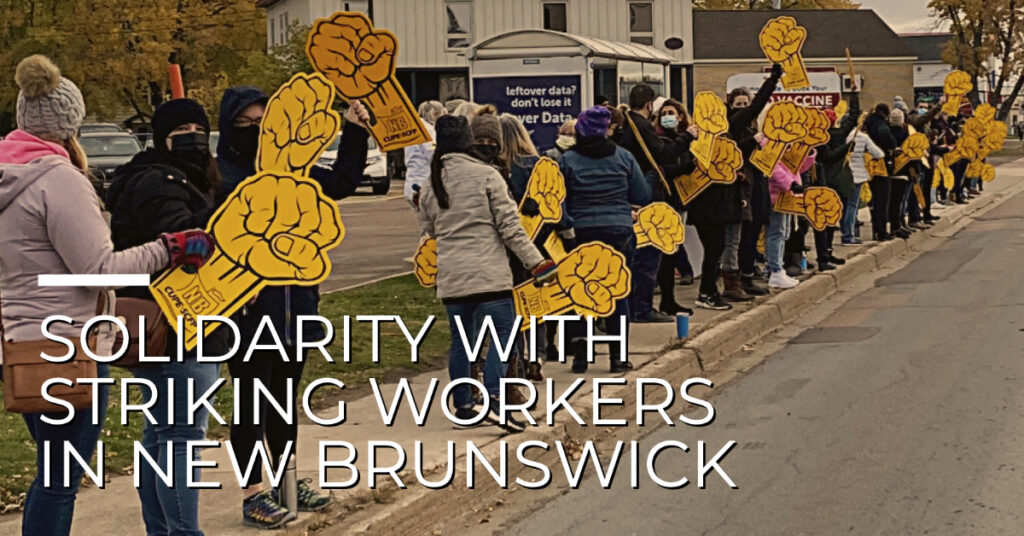Solidarity with Striking CUPE Workers in New Brunswick
Twenty-two thousand workers in ten CUPE Locals are fighting the Tory government of hard-right Premier Blaine Higgs in New Brunswick. Workers in education, transportation, municipal services, universities, social services, nursing homes, corrections, and healthcare workers deemed non-essential, have been on the picket lines since October 29th. One of the issues in the strike is pensions, the government’s unilateral decision to stop funding the “Public Service Pension Plan” 5 years ago, and its current efforts to force the two union locals that haven’t agreed to opt-in to the shared-risk pension plan that replaced it, to do so.
CUPE has joined a lawsuit challenging the government’s “unilateral conversion” of the pension plan, stating it is a violation of members’ right to free collective bargaining. Unlike their provincial government employer, the 22,000 workers have continued to pay into the Public Service Pension Plan, though the plan is now jeopardized by the government’s refusal to pay its share.
The other big issue is wages, which CUPE has fought to substantially increase for its members across Canada. The already low wages of many public sector workers have stagnated over many years, and are now being further eroded by steeply rising prices of food, fuel and housing, and rising interest rates. Real wages are falling, which is why CUPE opened bargaining with a demand for a four year contract and wage increases of 5% annually.
The five-year contract now being negotiated is a year longer than previous contracts, but includes a financial incentive of 25 cents per hour on top of a 2% raise each year. The union has proposed that in the last 2 years of the contract the hourly pay increase by 50 cents an hour. The union’s bargaining committee says their proposal will generate an overall increase for all members of between 3 – 4% over the 5 years. The other issues are retroactive pay owed by the employer to workers, and giving casual workers the same pay as permanent employees.
The big new issue in the strike is the back to work order imposed by the government November 5th, using the Emergency Measures Act to force thousands of non-essential healthcare workers back to work, in what is clearly an effort to break the strike. The government used this legislation, which was directly tied to the COVID pandemic, in order to mobilize public opposition to the strike. The evidence came a day later, when on November 6th many striking workers reported for work only to be sent home by their superiors. The healthcare crisis was not what Higgs reported to newscasters and the public, though the chaos resulting from the back to work order they declared was very real.
So are the fines for workers who don’t return to work. Individual workers would be fined a minimum of $480 per day up to a maximum of $20,400 per day, while the union would be fined $100,000 per day for every worker who didn’t return to work. The back to work order is to break the strike, but the fines would bust the union.
As Stephen Drost, President of CUPE New Brunswick stated during the mass protest at the Legislature November 6, the workers finally had enough and decided to fight. It is the biggest strike in 30 years, and it could get bigger as strike votes by New Brunswick Nurses (NBNU) will take place soon, while workers in the province’s Alcool NB Alcohol operations voted to strike November 6th.
The Communist Party of Canada stands in solidarity with the striking public sector workers in New Brunswick, who are fighting for a decent retirement and a living wage after 20 months of COVID and front-line work in hospitals, nursing homes, schools, municipal services, social services, transit, and other services across the province.
We demand that Premier Higgs immediately lift the back to work order, and negotiate a contract with CUPE that excludes the shared risk pension plan, and substantially increases wages. We also demand that the government pay the outstanding amounts overdue to the Public Service Pension Plan; and further, that it pay the outstanding retroactive pay owed to its employees.
The Higgs government should face legal and financial consequences for its anti-labour policies and its attacks on public employees in these negotiations and in the government’s unilateral conversion of the pension plan in 2016. The government is guilty of strike-breaking and union-busting, as well as seriously under-funding and eroding public services, not to mention lying to the public.
We further call on the labour and democratic movements across the country to also mobilize in support of these striking workers, many of whom are on strike for the first time in their lives, against a vicious anti-labour, anti-people government.
Unity can win!
Central Executive Committee, Communist Party of Canada

